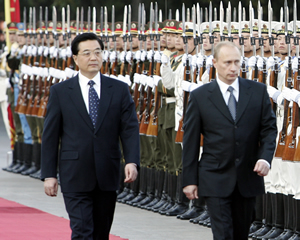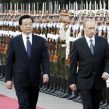
ANALYSTS DEBATE PROS AND CONS OF “EASTERN VECTOR” IN KREMLIN’S FOREIGN POLICY
Publication: Eurasia Daily Monitor Volume: 2 Issue: 137
By:

Most international and Russian experts seem to appreciate the geostrategic significance of the recent Shanghai Cooperation Organization (SCO) summit (see EDM, July 6, 7). The general consensus within the analytic community is that Beijing and Moscow have succeeded in turning the SCO into a rather effective tool to further their geopolitical interests in the strategic and energy-rich region of Central Asia. As the SCO’s influence grows, American political and military clout in Central Asia will diminish, and Moscow will regain its dominant position in the region, according to the majority of Russian security analysts. But there is a dissenting view, arguing that it is China and not Russia that will likely be the principal beneficiary if the United States is pushed out of the former Soviet backyard.
The bulk of Russia’s foreign policy specialists interpret the rallying of Central Asian states around what they call an emergent Russian-Chinese strategic axis as a clear sign of the regional leaders’ bitter disillusionment with America. Since the waves of the “color revolutions” began sweeping the post-Soviet lands in the end of 2003, the Central Asian autocratic rulers grew increasingly suspicious of Washington’s political designs and, naturally, became wary of the U.S. military presence in their territories.
Some Russian political pundits view the Andijan events as a crucial turning point in the changing of the region’s geopolitical equation — both in terms of the regional countries’ strategic orientation and of their domestic policies. According to several policy papers penned recently by Russia’s conservative political thinkers, following the political upheavals in Georgia, Ukraine, and Kyrgyzstan, as well as the violent riots in Uzbekistan, the Central Asian ruling clans appeared to have changed their perspective on a U.S. presence in Central Asia. Now the United States has likely come to be regarded as a “destabilizing factor rather than a necessary precondition for maintaining peace and security in the region.”
The irritation, if not the outright fear, caused by the perceived American policy of regime change in post-Soviet Eurasia is taking on the form of an “institutionalized protest,” as one commentary put it. In this context, all the recent Kremlin summitry — the meeting between President Vladimir Putin and Chinese leader Hu Jintao, Uzbek president Islam Karimov’s visit to Moscow, and the SCO gathering in Astana — has seemingly indicated that a group of regional countries is engaged in setting up an “institutionalized counterweight to American hegemony and expansionism in Central Asia.”
For many Moscow politicians and analysts, the current strengthening of the “eastern vector” of Russian foreign policy is the best possible way to restore the former superpower’s shaken posture in its traditional sphere of influence. The Kremlin strategists appear particularly satisfied with the fact that their Central Asian allies, proceeding from the Russian political elite’s favorite idea of geopolitical multipolarity, forcefully denounced efforts by any power to impose models of social development on other countries and, more importantly, demanded a deadline for closing the U.S. bases in Uzbekistan and Kyrgyzstan (see EDM, July 14).
The new realignment of forces suggests that Moscow is likely to regain its geopolitical prestige in Central Asia, some regional experts contend. As one Kremlin-connected analyst notes gleefully, “There is an impression that U.S. foreign policy expansion has reached its limits and now there begins an epoch of the gradual decline of American empire.”
For their part, the liberal analysts tend to explain what they call Russia’s “eastward retreat” by directly linking this geopolitical orientation to the political philosophy that currently dominates the minds of the country’s political elites. The Kremlin’s wariness and suspicions of the West, quite similar to those shared by its Central Asian partners, coupled with the strong desire to preserve the political status quo and maintain the “continuity of power” at the top, have seriously influenced Russia’s foreign policy course. Hence, Russia’s gradual but consistent “drift away from Europe and toward Asia,” some liberal-minded experts argue.
But even if Moscow does manage to increase its influence in Central Asia in the short-term, Beijing will likely be the biggest geopolitical winner in the long run, some analysts say. Russia, being China’s junior partner, will inevitably be forced to gradually cede both its dominant position in the region and access to Central Asia’s enormous energy resources to its much more powerful ally. Thus, what now appears to look like a return of the Soviet Union’s “soft underbelly” to Mother Russia’s fold is more accurately a slow but steady process of transformation of Central Asian region into Beijing’s expanded zone of influence.
(Trud, July 8; RFE/RL, July 9; Asia Times, July 12; Komsomolskaya pravda, Vedomosti, July 13; Taipei Times, July 14)




